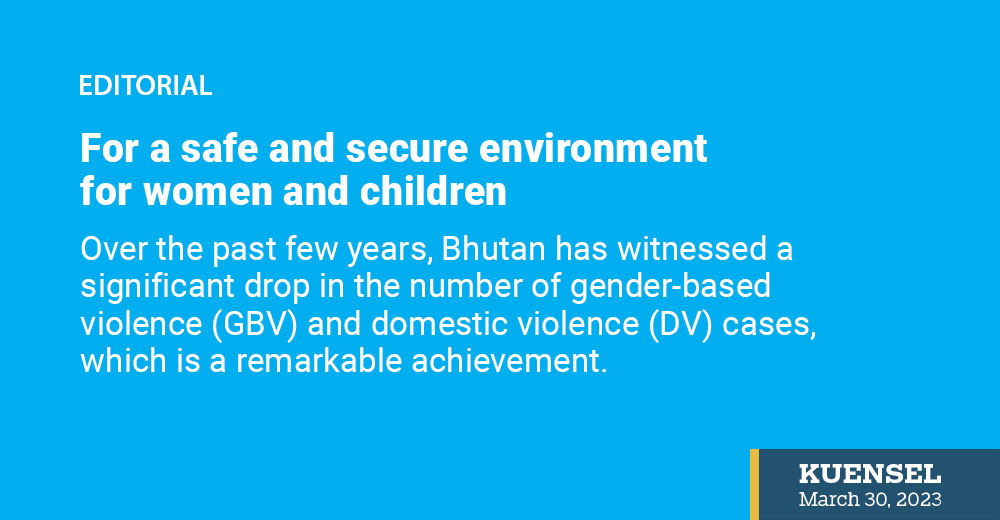Over the past few years, Bhutan has witnessed a significant drop in the number of gender-based violence (GBV) and domestic violence (DV) cases, which is a remarkable achievement. According to the National Commission for Women and Children (NCWC), there was a 35 percent reduction in GBV cases and a 25 percent drop in DV cases between 2018 and 2020. Respect Educate Nurture and Empower Women (RENEW) and the Royal Bhutan Police recorded 565 cases last year compared to 751 cases in 2021.
This reduction in GBV and DV cases in Bhutan is an indication of the country’s strong commitment to creating a safe and secure environment for its citizens, especially women and children. The Bhutanese government has taken several measures to provide support and protection to victims, including setting up dedicated help lines, shelters, and counselling services. The government has also put in place strict laws to deter perpetrators and ensure justice for victims.
This positive trend is not just limited to the legal and political spheres. Bhutanese society has also played a crucial role in reducing GBV and DV cases. Communities, religious institutions, and civil society organisations have been proactive in raising awareness about the harmful and damaging effects of violence and promoting gender equality. The media, in particular, has played a vital role in highlighting cases of violence, holding perpetrators accountable, and promoting positive role models.
In 2021, as Bhutan began seeing a remarkable and sustained reduction in GBV and DV cases in the country, Her Majesty the Gyalyum Sangay Choden Wangchuck, UNFPA Goodwill Ambassador to Bhutan, said: “Efforts have been stepped up on other fronts, taking lessons learnt from the Covid-19 pandemic to enhance access to service delivery. The NCWC, Ministry of Health and Ministry of Education, along with CSOs like RENEW and other stakeholders, in partnership with UN agencies such as UNFPA, UNDP, UNICEF, and WFP are working together on a number of fronts.
“We are optimistic that ensuring the safety and well-being of women and children in Bhutan and around the world will continue to be a top priority.”
This positive development in the areas of GBV and DV cases is a cause for celebration, but it is also a call for further action. It is essential to continue investing in prevention strategies, such as education, awareness-raising, and community mobilisation, to ensure that this uplifting trend continues. It is also important to improve access to justice and support services for victims, particularly those in rural and remote areas, where resources are painfully scarce.
The reduction in GBV and DV cases in Bhutan is a gleaming exemplar of what can be achieved when governments, civil society, and communities work together to achieve a common goal. To say the least, it is a testament to the resilience and determination of the Bhutanese people to build a peaceful and inclusive society. We can sure pat ourselves on our backs for such a phenomenal feat, but more importantly, we must continue to build on this progress and strive towards a future where violence is not tolerated, and every citizen can live in safety and dignity.


